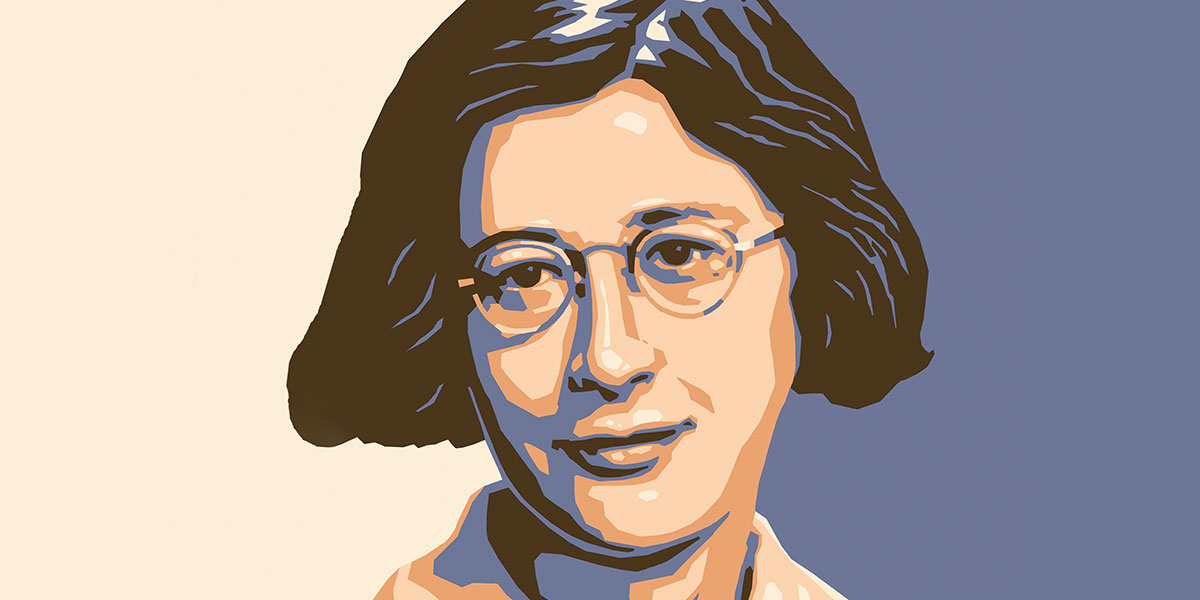Simone Weil
|
Simone Adolphine Weil; 3 February 1909 – 24 August 1943) was a French philosopher, mystic, and political activist. The writings of Simone Weil first appeared in the late 1940s and early 1950s – the period after World War II characterized by a widespread desire to return to normalcy in Western societies. Having defeated the “great beast” of totalitarianism, the liberal democracies concentrated on creating the good life at home. In America, especially, it was the golden age of the middle class: a comfortable, even affluent lifestyle seemed within the reach of everyone. Given this context, it is not surprising that Weil, who had died in 1943, quickly achieved legendary status among a whole generation of countercultural intellectuals and spiritual seekers. Her writings are radically, vehemently anti-bourgeois, as was her short, intense life. Christians and atheists alike seemed to find in Weil a corrective to the burgeoning consumer culture that threatened to stifle the life of the mind and the soul.
After her untimely death at age thirty-four, Simone Weil quickly achieved legendary status among a whole generation of thinkers. Her radical idealism offered a corrective to consumer culture. But more importantly, she pointed the way, especially for those outside institutional religion, to encounter the love of God – in love to neighbor, love of beauty, and even in suffering. |
Quotes
|
“Thy kingdom come.” This concerns something to be achieved, something not yet here. The kingdom of God means the complete filling of the entire soul of intelligent creatures with the Holy Spirit. The Spirit bloweth where he listeth? We can only invite him. We must not even try to invite him in a definite and special way to visit us or anyone else in particular, or even everybody in general; we must just invite him purely and simply, so that our thought of him is an invitation, a longing cry. It is as when one is in extreme thirst, ill with thirst; then one no longer thinks of the act of drinking in relation to oneself, nor even of the act of drinking in a general way. One merely thinks of water, actual water itself, but the image of water is like a cry from our whole being.”
-Simone Weil “For it seemed to me certain, and I still think so today, that one can never wrestle enough with God if one does so out of pure regard for the truth. Christ likes us to prefer the truth to him because, before being Christ, he is truth. If one turns aside from him to go toward the truth, one will not go far before falling into his arms.” -Simone Weil “Attention is the rarest and purest form of generosity.” -Simone Weil “Only two things that pierce the human heart: beauty and affliction.” -Simone Weil "The beauty of this world is Christ's tender smile coming to us through matter". -Simone Weil “We do not obtain the most precious gifts by going in search of them but by waiting for them.” -Simone Weil Waiting for God “the soul knows for certain that it is hungry…A child does not stop crying if we suggest to it that perhaps there is no bread. It goes on crying just the same.” -Simone Weil “Imaginary evil is romantic and varied; real evil is gloomy, monotonous, barren, boring.” -Simone Weil “All sins are attempts to fill voids.” -Simone Weil "Those who are unhappy have no need for anything in this world but people capable of giving them their attention. The capacity to give one’s attention to a sufferer is a very rare and difficult thing; it is almost a miracle; it is a miracle. Nearly all those who think they have this capacity do not possess it. Warmth of heart, impulsiveness, pity are not enough…The love of neighbor in all its fullness simply means being able to say to him: ‘What are you going through?’" -Simone Weil It is a recognition that the sufferer exists, not only as a unit in a collection, or a specimen from the social category labeled “unfortunate,” but as a man, exactly like us, who was one day stamped with a special mark by affliction. For this reason it is enough, but it is indispensable, to know how to look at him in a certain way. This way of looking is first of all attentive. The soul empties itself of all its own contents in order to receive into itself the being it is looking at, just as he is, in all his truth.” -Simone Weil. Waiting for God pg. 64, 65. “Like a gas, the soul tends to fill the entire space which is given it. A gas which contracted, leaving a vacuum, this would be contrary to the law of entropy. It is not so with the God of the Christians.…Not to exercise all the power at one’s disposal is to endure the void. This is contrary to all the laws of nature. Grace alone can do it. Grace fills empty spaces, but it can only enter where there is a void to receive it, and it is grace itself which makes this void.” -Simone Weil Source: Love in the Void |


